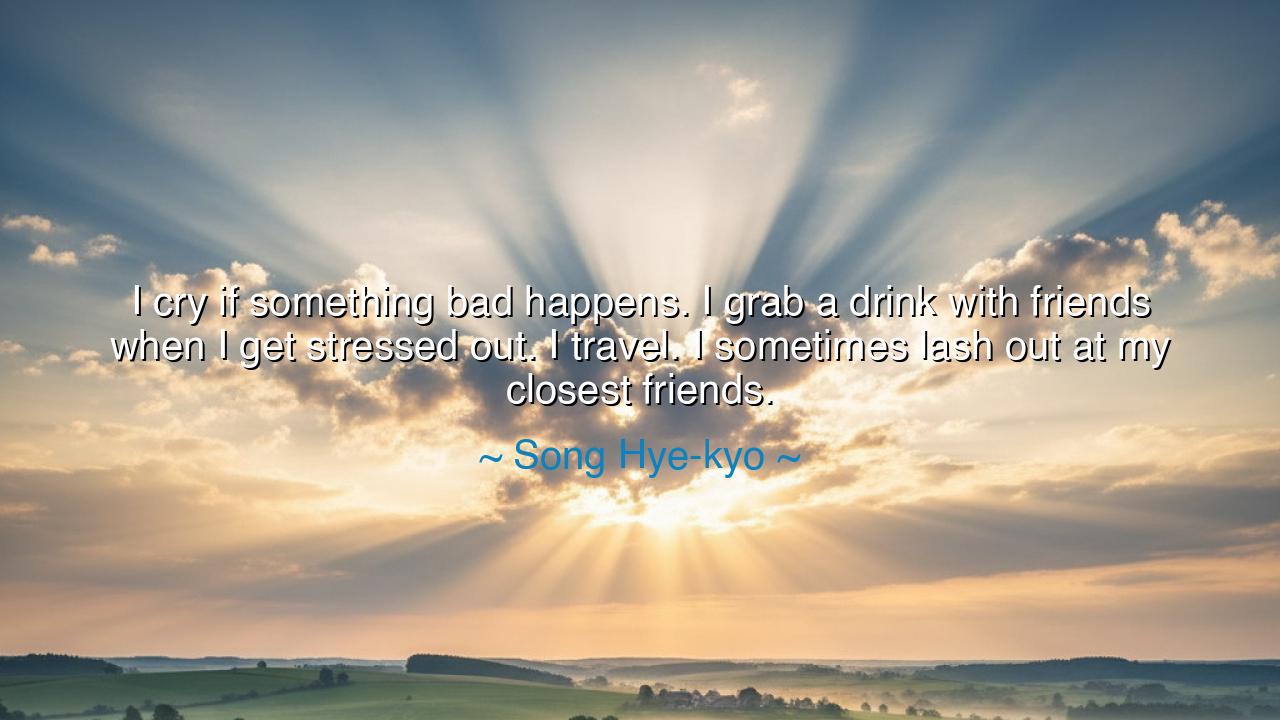
I cry if something bad happens. I grab a drink with friends when
I cry if something bad happens. I grab a drink with friends when I get stressed out. I travel. I sometimes lash out at my closest friends.






Song Hye-kyo, in the tenderness of her honesty, unveils a truth as old as humanity itself: “I cry if something bad happens. I grab a drink with friends when I get stressed out. I travel. I sometimes lash out at my closest friends.” These words, though plain, are a mirror to the human heart. They remind us that to live is not to be untouched by sorrow, nor to be always composed, but to move through the storms of life with frailty, with reaction, with imperfection. She does not cloak herself in pride; she admits to her humanness, and in this admission, we find wisdom.
The first act she names is to cry. Tears, though often despised as weakness, are in truth the purest form of strength. They are the cleansing of grief, the body’s way of admitting what words cannot say. Even the ancients honored tears: Achilles wept for Patroclus, David wept for Jonathan, and emperors bowed their heads in secret sorrow. To shed tears when “something bad happens” is not defeat, but the soul’s release, a way to carry pain without being broken by it.
Next she speaks of seeking a drink with friends in times of stress. This is not a hymn to excess, but to companionship. When burdens weigh upon the heart, the company of friends is a shield, a reminder that no soul was meant to endure alone. In the taverns of medieval Europe, peasants shared laughter to escape hardship; in the tea houses of the East, scholars exchanged poetry to lighten sorrow. The drink is symbolic: it is not the cup itself, but the fellowship it represents, the warmth of human presence that turns despair into resilience.
Then comes her word of travel. To move beyond one’s place of suffering is to grant the spirit fresh air. Travel allows us to step outside the walls of our own sadness, to see that the world is vast, and that our troubles, though heavy, are not the whole of existence. Like the pilgrim who journeys to sacred shrines, the traveler finds renewal in the unfamiliar. The road, the mountain, the sea—these are healers in their own right, teaching perspective and offering solace.
Yet she confesses, too, that she sometimes lashes out at her closest friends. This is the most vulnerable part of her truth, for it admits failure, the way grief and stress sometimes harm those we love most. And here lies the most human lesson: that we are flawed, and our struggles often spill into the lives of others. Even great figures of history bore this flaw—Churchill, burdened by depression, struck harsh words at his allies; Martin Luther, fiery in his struggle, sometimes wounded those near him. But though they faltered, they also sought forgiveness, and their greatness remained.
The meaning of her confession is not to justify, but to reveal: to be human is to stumble, to feel deeply, to sometimes wound, but also to heal, to love, to grow. Song Hye-kyo’s words echo the shared humanity of us all—our need to grieve, to seek company, to escape, to err, and to return again to love. It is not perfection that defines us, but the courage to admit imperfection and continue walking forward.
What then is the lesson for us? It is this: embrace your humanity. Allow yourself to cry when grief demands it. Seek friends when burdens overwhelm you. Use travel as a balm when your spirit needs renewal. And when you lash out, be humble enough to ask forgiveness, and gracious enough to forgive in turn. Life is not lived in flawless serenity, but in honest imperfection.
Practical counsel follows: cultivate friends who can hold you in your weakness, create spaces for release, and forgive yourself when you falter. For in acknowledging our humanity, we discover strength, and in walking together through sorrow and joy, we become whole. Thus, let us live as she has spoken—not as saints without blemish, but as mortals with courage, who feel, who fall, who rise, and who love still.






AAdministratorAdministrator
Welcome, honored guests. Please leave a comment, we will respond soon